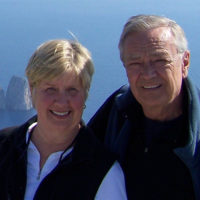Alumni Spotlight
How We Can Give Our Future Colleagues a Helping Hand
A Class of ’65 alumnus reflects on how financial aid helped his education — and how to pay it forward.

Much has changed in medicine over the course of Richard Baerg’s, MD ’65, long and distinguished career in gastroenterology. But one thing that’s stayed the same, he says, is how much scholarships can change medical students’ lives.
“I couldn’t have gone to medical school without help — I was just a broke student,” says Baerg. By working during summer, he recalls, he earned spending money for the school year, but financial aid was essential to help cover his tuition and books. “I received scholarships all the way through, and it really made a huge difference.” He never forgot how much it meant and hoped he would someday be able to help others in turn.
Originally from Canada, Baerg studied engineering at the University of Washington and chemistry at Pacific Lutheran University before applying to the University of Washington School of Medicine.
“We had such uncommon faculty: Robert Petersdorf, Robert H. Williams, Bill Rieke,” Baerg says. “They had such an impact on all the students, because they knew so much and could teach so well.” Robert Petersdorf, MD, then chief of medicine at the UW School of Medicine, also had an impact on Baerg’s decision to specialize in academic medicine.
After his first year of medical school, Baerg married his wife, Judith, a pediatric nurse, and began raising a family. Following residencies at Presbyterian Hospital and a gastroenterology fellowship at Columbia-Presbyterian Medical Center, he completed his military service and taught gastroenterology as an assistant professor at the University of Texas Medical School at San Antonio. He then served as an assistant professor of medicine at Harvard Medical School, teaching gastroenterology and biophysics, but found himself missing clinical care, so he returned to Washington to help establish Gastroenterology Associates of Tacoma.
“When we started, we didn’t have colonoscopies, endoscopies, ultrasound or CAT scans,” Baerg recalls. He was the first trained gastroenterologist serving the Tacoma area, and the practice grew steadily over the years, adding other endoscopic treatments and a swallowing disorder program, an endoscopy center and a research center. “All these new procedures were fascinating to learn, but patient interactions were always the highlight for me.”
The Baergs have been supporters of the UW School of Medicine for decades, but after retiring, they began considering a larger gift. Knowing the challenges today’s students face — and remembering how much scholarships had helped Baerg — they decided to support the Class of 1965 Endowed Scholarship Fund.
“Today’s students have the same mission, orientation and love for what they do as we did, but their challenges are gigantic,” says Baerg. “The costs have become enormous. The average family couldn’t support it, and certainly not low-income families.” Other issues, he says, include fewer residencies and limited job opportunities for new physicians, as well as the longer-term effects COVID-19 will have on medical education and the field of medicine.
The Baergs made their gift through an existing IRA. The process was simple and convenient, says Baerg, and making a gift with an IRA can have tax benefits for both donor and recipient. “Giving through your IRA is a great way to do charitable gifts,” he says. “It’s unbelievably easy.” He’s proud that the UW scholarship fund has supported 20 medical students to date.
This spring, Baerg is planning to attend his class reunion online; the event was originally scheduled for 2020, but was postponed due to the COVID-19 pandemic. He’s looking forward to catching up with his classmates, reminiscing about their medical-school days — and perhaps encouraging others to donate to their own class gift or the UW Medicine Endowed Scholarship Fund.
“We can’t do much about lowering the cost of medical education, but I can’t think of a better thing to do than help our future colleagues by easing some of the burden,” says Baerg. “It’s a very worthwhile thing to do.”

